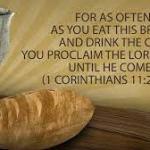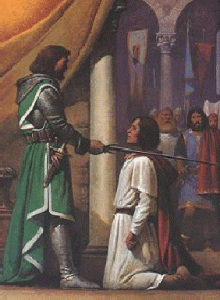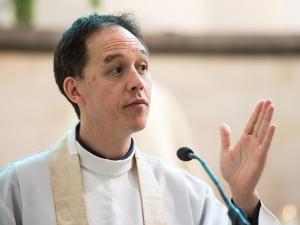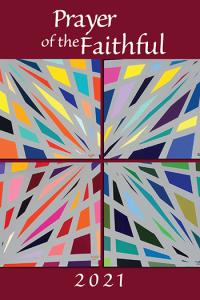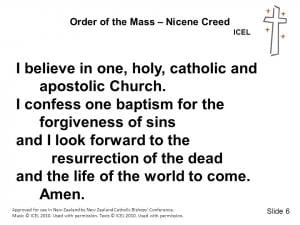
Between the Liturgy of the Word (see this post) and the next main part of the Mass stands a small part we call the Creed. Our imaginary visitor from space, who has seen both today’s and the pre-Vatican II Mass, notices little difference here except for the obvious change from Latin to English. But there is something so odd, so contrary to our expectations that she might be the only one noticing it. (Remember she doesn’t have any expectations.)
This is the fourth post in a series on the Mass as we celebrate it today.
When you call something a creed, people expect to get a statement of beliefs. Like, maybe…
- There is an all-good, all-knowing, all-powerful god. Or, there isn’t.
- My job is to know God, to love God, and to serve God in this world so that I may be happy with God forever in heaven. Or, we are here to help each other, but take care of yourself first.
- The world is a valley of tears or maybe a garden of delights.
- The world is getting better (or worse) all the time.
- Every good and bad deed must have its just recompense. An eye for an eye and a tooth for a tooth. God will balance the scales of justice after we die, if not before. Or, forgive seventy times seven times.
It would make a lot of sense if the Creed of the Mass were like that. Just like life in the world, we start out with a period of education, including some stories to get across important points in a meaningful way. We sum up what we’ve learned in some guiding principles. Then we get on with the business of life. But the Creed isn’t like that, and neither is the Mass.
A story, not an essay
The first thing our visitor notices about the Creed is that it’s another story.It’s not an essay detailing things I believe. One little word changes everything. It’s what, or rather Who, I believe IN. When I say “I believe in you,” I’m not saying “I believe you exist.” This is not stating a fact, it’s putting myself into your story and on your side. With the first sentence of the Creed, I declare my loyalty to and trust in God, whose story includes some amazing deeds. I put myself in that story, which is not finished yet.
The next thing to notice is that this Creed is a poor summary of the stories we learn (or rather celebrate) in the Liturgy of the Word. When you summarize a story or a lesson, you can put the original aside. You have what you need with just the summary, especially if the whole point is to get on with living. The Christian Creed is no substitute for the Bible. It’s a guide to reading the Bible. And, the Liturgy of the Word isn’t just preparation. It’s living the story.
Having a story, a counter-cultural thing
The modern world doesn’t have a story. It has stories, all of them set out as if on shelves, consumer goods in our consumer society. If you like, you can choose a story shipped in from oceans away. Or one from the soil where you live. Or even the Christian story. There are any number of reasons why we might choose one or the other. And no shortage of reasons why somebody else might choose a different one.
Notice how independent we are from such stories. Because we are independent choosers, because no choice is forced on us, the existence of multiple stories is not problem. They all get along quite nicely without ever a real encounter of one with another. Freedom of choice and tolerance are partners in this world.
The Christian Creed doesn’t have that kind of tolerance. The story of God, who creates “all things visible and invisible,” looks for an encounter with other stories. Jesus’ story tells of one who lived and died “for us and for our salvation.” It challenges some other stories, the ones that say we save or condemn ourselves. The story of the Spirit, “who has spoken (and still speaks) through prophets,” demands a hearing. Prophets (today think Greta Thunberg) don’t care about your freedom to believe what you want; they care about the truth. The Christian Creed would gather us into one true story. We can disagree. We have fought over it. But at least it calls us together.
I believe in (or with) the Church
Here’s a problem that must unsettle most believers. The faith of Christians depends on the Church. But that Church proves itself over and over to be unworthy. The current crises of sexual abuse and clericalism in the Church are not exceptions to the historical pattern. That would seem to justify the modern world when it makes the individual its own authority on fundamental beliefs. This may be the first place where a dividing line gets drawn: Are we shoppers who can call this story or that story our own, or are we ultimately owned by our story? Are we, perhaps, even made by our stories so that changing a story would mean changing who we are? Do we really choose a story, or is that just the final step along a path which we can opt out of at any point or allow to lead us wherever it will, perhaps to the Church. Maybe that’s what grace means.
The Creed doesn’t explain how an imperfect instrument like the church can handle such an important job as transmitting stories. It leaves that and many other things for us to sort out as best we can. What does creation say about the relation between God and the world? From what and for what does Jesus save us? How do we discern, among all the prophets, which ones give voice to the Spirit and which do not?
The Creed doesn’t make the answers easy, but it does reinforce what binds us into one story. After all, God is the unity of Father, Son, and Spirit. As Mass proceeds, the Liturgy of the Eucharist will unite us even more securely with Jesus and the community of his own throughout the ages. It will anticipate the day when all the walls that divide people give way to the praise of one God through Jesus and in the Holy Spirit.



